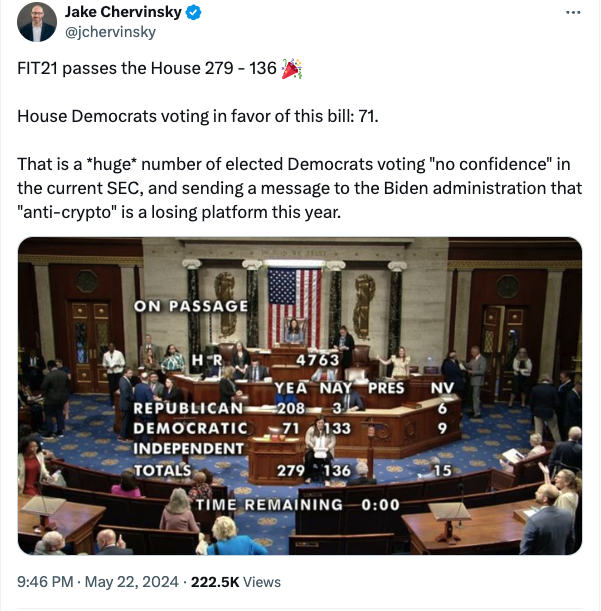A bill clarifying the oversight roles of the US securities and commodities regulator is in the works

A bill clarifying the U.S. securities and commodities regulator’s roles in controlling cryptocurrencies is heading toward an uncertain future as it moves through the Senate before reaching U.S. President Joe Biden’s desk.
The House passed the Republican Financial Innovation and Technology for the 21st Century (FIT21) Act, or H.R. 4763, on May 22 with 71 Democrats in favor, 208 Republicans in favor, and 136 against.
However, its future in the Senate is unclear, lacking a companion bill and facing one of the country’s biggest cryptocurrency critics, Elizabeth Warren. However, the same Senate passed a resolution last week calling for the repeal of the rule banning banks and cryptocurrency companies from doing business.
However, it could be months before the 100-member Senate considers FIT21 — and there is no time limit on when senators must act.
Even if they do, the bill will likely be sent to committee for possible rounds of reviews, hearings and revisions. If it survives, a majority – 51 senators – would have to vote to pass it.
Parts of FIT21 could change, and members of the House and Senate will meet to iron out any differences in their own versions of the bill. The bill will then return to the House and Senate for final approval.
President Biden will then have ten days to sign or veto FIT21. However, his administration said on May 22 that it opposed passing the bill, but did not say it would veto it.
Even if Biden vetoes FIT21, the House and Senate can override it by re-passing it in both chambers with at least a two-thirds majority.
Industry applauds passage
SEC Chairman Gary Gensler publicly opposed FIT21 on May 22, saying it created “new regulatory gaps” and endangering the stability of capital markets. Many viewed its passage in the House of Representatives as an early victory for cryptocurrencies.
Coinbase CEO Brian Armstrong called the bill’s passage, along with the endorsement of 71 Democrats, a “total victory” and a victory for “clear rules on cryptocurrencies.”
“That’s a lot of Democratic elected officials who voted against the current SEC,” said Jake Chervinsky, legal director of Variant Fund.

However, cryptocurrency attorney Gabriel Shapiro threw cold water on the celebration, arguing on X that FIT21 would still give the SEC “enormous power.”
about: Ethereum ETF approvals become a “giant political problem” – Joseph Lubin
“It provides for a dual regulatory system, shared between the SEC and the CFTC,” he added. “It does this by giving the CFTC power it has never had before: regulatory authority over the cash commodities market.”
FIT21 largely hands control of cryptocurrencies to the Commodity Futures Trading Commission, which the industry views as a more relaxed regulator than its securities counterpart.
However, the SEC will have regulatory authority over cryptocurrencies that are not sufficiently decentralized, but FIT21 will also create a way to sell cryptocurrencies that treat securities as commodities.
review: Fear and doubt among lawmakers are the motivation behind the proposed regulation of cryptocurrencies in the United States.